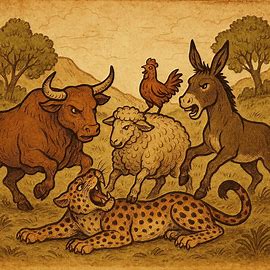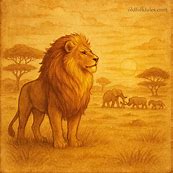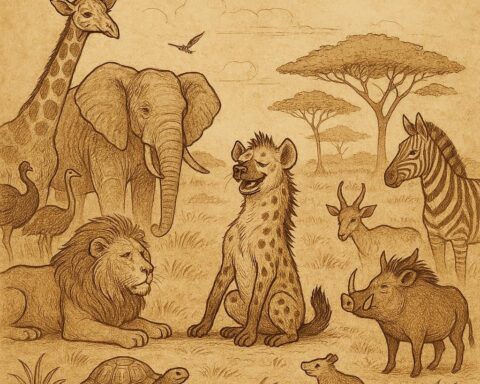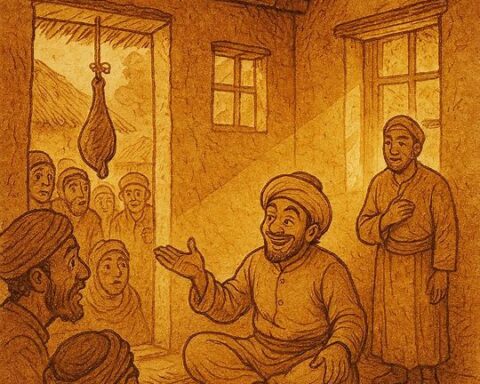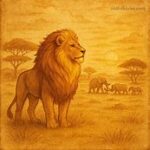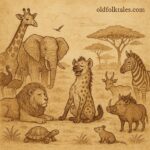High upon a lonely mountain in Eritrea, four animals made their home: the ox, the sheep, the chicken, and the donkey. Life on that rocky height was harsh. The winds blew cold, the ground lay dry and barren, and each day the creatures grew leaner and weaker. Hunger gnawed at their bellies, and thirst parched their tongues until they could bear it no longer.
So they gathered together and said: “We must find water and grass, or else we shall perish.” After much talk, they decided to send the donkey as their scout, for he was known for his strong legs and tireless stride.
The donkey trotted down the mountain and, after much wandering, discovered a valley where cool water sparkled and thick grass swayed in the breeze. But instead of hurrying back to share the news, he drank deeply, filled his belly, and returned at evening with his secret locked inside.
When the others asked him eagerly, “Did you find anything for us?” he lied: “I found nothing.”
But the chicken, sharp-eyed and suspicious, demanded: “Show us your mouth!” When the donkey opened his lips, the green traces of grass betrayed him.
“Ah, how you have deceived us!” the chicken cried.
The donkey, embarrassed but unwilling to admit fault, muttered: “I only picked up a little grass on my way back, but found no place.”
The group, disappointed, resolved to try again. This time they sent the ox, who lumbered off down the mountain. He too found the valley of grass and water. But unlike the donkey, the ox thought of his companions. He returned to them and said honestly: “I have found water and grass, come, let us go together.”
READ THIS: The Tale of the Two Donkey-Owners: An Eritrean Folktale That Teaches Lessons on Freedom and Desire
So the four went down and settled in the valley. They drank their fill, ate until their stomachs were heavy, and rested. The donkey grew fat and spry, regaining his strength. One day, in his vanity, he said: “Allow me to bray once, only once, to prove my vigor!”
But the others, wise to danger, said: “No, be silent! If your voice is heard, our enemies may come upon us.”
Yet the donkey persisted, pleading and nagging, until at last they said: “Very well, bray once, but softly.”
The donkey lifted his head and brayed with a loud, booming cry.
Far away, a fox and a leopard sat together. The fox pricked his ears and said: “Did you hear? That is the bray of a donkey.”
But the leopard scoffed. “There are no donkeys in this desert, you lie.”
Then the donkey brayed again, louder than before, shaking the air. The fox laughed: “You see? It is true.”
Together, the fox and leopard crept toward the valley. As they neared, the fox whispered: “There they are!” But true to his sly nature, he fled and left the leopard to strike alone.
The four animals trembled with fear as the leopard approached. But the chicken, ever quick of mind, cried: “Do not despair! If the leopard leaps upon us, I shall fly at him and peck out his eyes. Ox, pierce him with your horns. Sheep, strike him with your head. Donkey, trample him with your hooves.”
The leopard sprang, but the animals followed the chicken’s counsel. The chicken blinded him, the ox gored him, the sheep rammed him, and the donkey crushed him. Together they killed the leopard, skinned him, and spread his hide upon the ground.
Soon the fox returned, still scheming. He led a band of elephants to the place, thinking, “Now they shall be destroyed.”
The animals quailed at the sight of the giants. But the chicken stepped forward and said: “The greatest among you must prove it! Sit upon this leopard’s skin.”
The elephants argued fiercely. “I shall sit upon it!” cried one. “No, I shall!” bellowed another. In their pride they fought, trampling and goring each other until they killed themselves.
Foiled again, the fox gathered the hyenas and brought them to the valley. The hyenas called to the chicken: “Come to us, that we may hold a council.”
But the chicken, wary, replied: “If one hyena will carry me upon his back with a load of grass, I shall ride to you.”
The hyenas agreed, and one carried him, stacked high with dry grass. Before mounting, the chicken whispered to his companions: “When I say, ‘Give me a whip,’ hand me a burning stick.”
Once upon the hyena’s back, he cried: “Give me a whip!” His friends passed him a glowing ember. The chicken struck the grass with fire and flew into the sky.
The hyena, ablaze, ran screaming to his pack. But when the others saw the flames, they fled in terror. Thus, the hyenas too were defeated.
At last the chicken turned to his companions and said: “Now let us part. Ox, join the cattle. Sheep, join the flocks. Donkey, return to the donkeys. As for me, I shall gather the droppings of roasted corn in my Kabasa.”
And so it is said that chickens became plentiful in Kabasa, multiplying until this very day.
Moral Lesson
This Tigrean tale shows that unity, courage, and cunning can overcome even the strongest of foes. Though the donkey betrayed trust and endangered the group, the wisdom of the chicken and the cooperation of all saved them from destruction. Pride, like that of the elephants, leads only to ruin, while sly malice, like that of the fox, brings no reward.
The story teaches us that true survival lies not in strength alone but in honesty, trust, and cleverness. Each creature has a role to play, and when they act together, even a leopard can be slain and a host of enemies outwitted.
Knowledge Check
1. Which animal first scouted for water and grass?
The donkey, who lied about his discovery.
2. How did the chicken expose the donkey’s deceit?
By asking him to show his mouth, which revealed grass.
3. Who suggested the plan to defeat the leopard?
The chicken, who organized the defense.
4. How did the elephants destroy themselves?
They argued over who was greatest and fought until they killed each other.
5. What trick did the chicken use against the hyenas?
He rode a hyena loaded with grass, lit it on fire, and escaped.
6. Where did chickens become plentiful according to the tale?
In Kabasa, Eritrea.
Source: Tigrean (Tigrinya) folktale, Eritrea.
